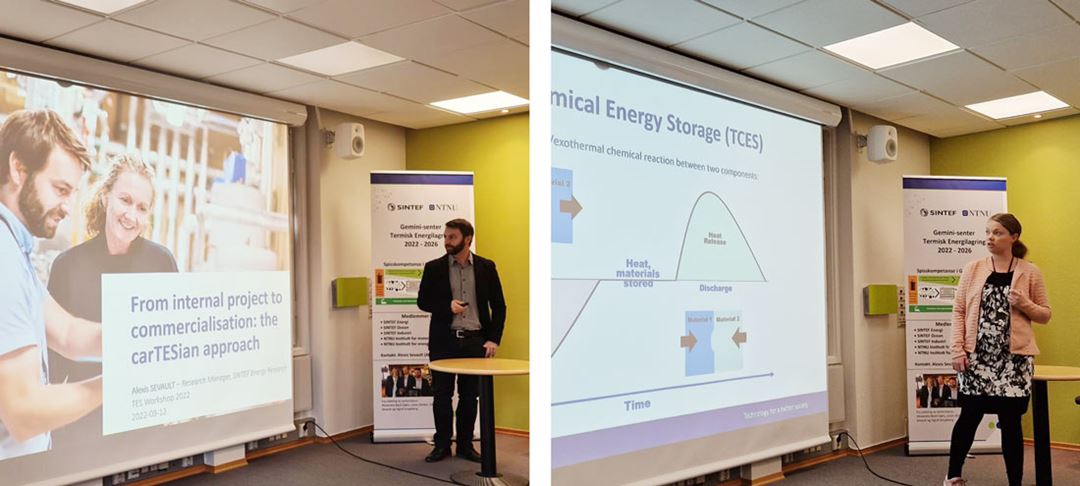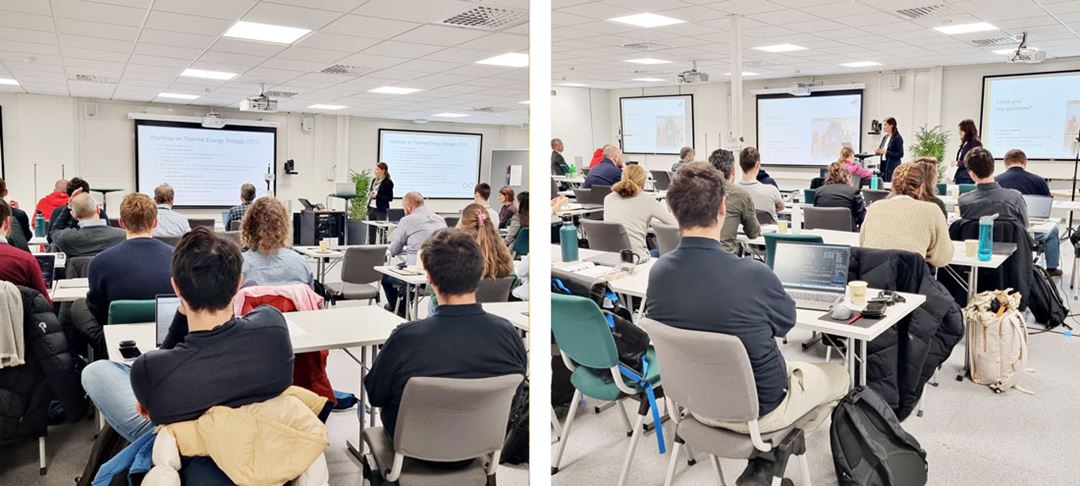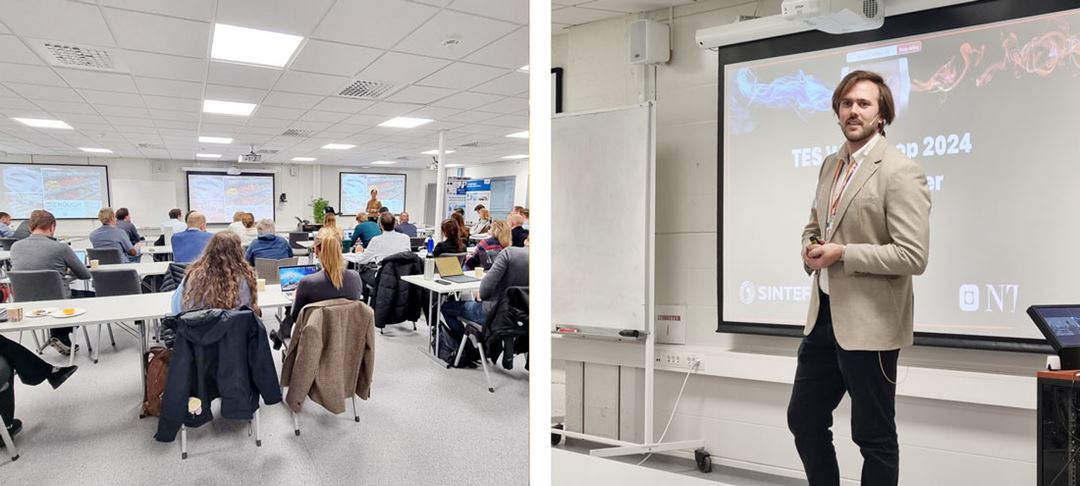
Gemini Centre for Thermal Energy Storage
Impact
Our impact by numbers
GS TES’s contributions to research, education, and industry engagement are reflected in the following key metrics (as of 2025):
- Proposals on TES from the partners: 20 (including joint infrastructure and SFI applications; the SFI proposal is currently active in TRINN2)
- Projects on TES from the partners: 22
- Students across SINTEF-NTNU on TES: 12
- Journal articles: 10
- Conference papers: 20
- Pop-science dissemination: 7 articles
Read our articles
- Snart kan varmepumper også lagre varme – og fordele den når det trengs (in Norwegian)
- How do we store heat in homes efficiently, environmentally friendly and affordably?
- Cooling AI: How Phase Change Materials Make a Difference – SINTEF Blog
- Revolutionizing data center efficiency with next-gen cooling - SINTEF
- Thermal batteries: For smarter use of Energy – SINTEF Blog
- Hvordan skal all den grønne energien lagres? (in Norwegian)
Project portfolio on TES
GS TES leads and collaborates on a wide range of national and international projects focused on advancing TES technologies. These projects span fundamental research to real-world applications, ensuring solutions are scalable, impactful, and aligned with industry needs.
Partner Abbreviations:
- SINTEF ER: SINTEF Energy Research
- SINTEF OC: SINTEF Ocean
- SINTEF IND: SINTEF Industry
- NTNU IMA: NTNU – Department of Materials Science and Engineering
- NTNU EPT: NTNU – Department of Energy and Process Engineering
| Project | Project Lead | Type and Duration |
|---|---|---|
| GreenDC | Hanne Kauko | KSP 2025-2029 |
| ZenITh | Davide Tommasini | — 2026 |
| CoolFish | Kristina N. Widell SINTEF OC |
KSP 2019–2023 |
| ChiNoZEN | Vojislav Novakovic NTNU EPT |
— 2020–2025 |
| PCM-STORE | Ragnhild Sæterli SINTEF ER |
KSP 2020–2024 |
| FME HighEFF | Petter Røkke SINTEF ER |
FME 2016–2024 |
| TRAINING | Natasa Nord NTNU EPT |
CETP-KSP 2023–2026 |
| Sure2Coat | Martin Fossen / Galina Simonsen SINTEF IND |
EU HORIZON 2023–2025 |
| ITChES | Jorge Salgado SINTEF ER |
NEIC (FME, HighEFF) 2023–2024 |
| MODERATOR | Galina Simonsen SINTEF IND |
EU HORIZON 2024–2027 |
| PCM-STOVE | Magnus Rotan SINTEF ER |
IPN 2021–2024 |
| SOCTES | Magnus Rotan SINTEF ER |
NEIC (FME, HighEFF) 2022–2023 |
| TES-AC | Davide Tommasini SINTEF ER |
NEIC (FME, HighEFF) 2023–2024 |
| Competes | Jorge Beceiro SINTEF ER |
IPN 2024–2027 |
| InterLES | Magnus Rotan SINTEF ER |
IPN 2024–2027 |
| HiTES | Magnus Rotan SINTEF ER |
KSP 2025–2029 |
| La-Flex | Olav Galteland SINTEF ER |
CETP-KSP 2024–2027 |
| EIS - Isslurry ved Rørosmeieriet | Kristina N. Widell SINTEF OC |
RFF Trøndelag 2025–2026 |
| ENOUGH | Kristina N. Widell SINTEF OC |
EU H2020 2021–2025 |
| ENTRANCE | Natasa Nord NTNU EPT |
EU Horizon 2025–2028 |
These projects reflect GS TES’s commitment to delivering innovative TES solutions through strong collaborations with research institutions, industry partners, and policymakers.
Main benefits of TES
- Energy Efficiency and Cost Savings: TES enables peak-shifting, reducing energy consumption during high-demand periods. This leads to lower energy costs for industries, buildings, and communities.
- Flexibility in Energy Systems: By providing demand-side flexibility, TES facilitates grid stability, congestion management, and participation in reserve markets. This flexibility is essential for integrating renewable energy sources and supporting electrification.
- Decarbonisation and Emission Reductions: TES solutions play a vital role in reducing CO₂ emissions by enabling cleaner heating and cooling alternatives and supporting the use of renewable energy sources across industrial and residential sectors.
- Sustainability and Circular Economy: TES systems promote sustainable energy use without reliance on critical raw materials (CRMs) and minimize harmful waste. Lifecycle assessments and circularity considerations are integral to technology development.
- Sector Coupling and Hybrid Solutions: TES facilitates the integration of multiple energy systems (e.g., coupling with heat pumps and batteries), improving overall system efficiency and resilience.
- Industrial Innovation and Value Creation: By collaborating with industry partners, GS TES accelerates the development and deployment of TES solutions tailored to real-world applications, enhancing competitiveness and driving economic growth.
- Workforce Development: Through research projects, student involvement, and training programs, GS TES contributes to educating future experts, ensuring long-term knowledge transfer and capacity building.
These benefits underpin GS TES’s mission to position TES as a cornerstone technology for achieving a greener, more energy-efficient, and sustainable future.
Past editions of the TES Workshop
2022: The first TES Workshop organised under GS TES (previously hosted by SINTEF Energy Research) was held as a hybrid event, gathering 20 participants onsite and over 50 online. It marked the beginning of the Centre's efforts to engage both local and international TES communities.

2023: The workshop attracted more than 50 participants onsite and 50+ online. For the first time, international speakers were invited to present in Trondheim, expanding the event's global reach.

2024: Continuing its growth, the workshop maintained a similar attendance with 50+ participants onsite and online. The program featured a diverse lineup of international speakers and increased industry involvement.

This workshop not only serves as a knowledge-sharing platform but also plays a vital role in shaping the strategic direction of TES research and implementation in Norway and beyond.
Related TES events
Stay informed about global TES activities! In addition to the TES Workshop, GS TES provides a curated list of important TES-related events worldwide. These events offer valuable opportunities for researchers, industry professionals, and policymakers to stay updated and connected with the broader TES community.
| Event Name | Date | Location |
|---|---|---|
| 13th Swiss Symposium Thermal Energy Storage | 30 Jan. 26 | Lucerne, Switzerland |
| Enerstock Online 2026 | 10-11 Feb. 26 | Online |
| CIES 2026 – XX Congreso Ibérico y XVI Congreso Iberoamericano de Energía Solar | 23-25 Mar. 26 | Almería, Spain |
| 9th IIR Conference on Sustainability and the Cold Chain | 12-14 Apr. 26 | Istanbul, Turkey |
| ISEC 2026 – 4th International Sustainable Energy Conference | 14-16 Apr. 26 | Graz, Austria |
| UK Energy Storage Conference 2026 | 15-17 Apr. 26 | Edinburgh, UK |
| Eurotherm Seminar #119 | 13-15 May 26 | Lleida, Spain |
| 11th IIR Conference on Solid-State Cooling, Heating and Energy Harvesting | 7-11 Jun. 26 | Ljubljana, Slovenia |
| OSES 2026 – Offshore Energy and Storage Symposium | 8-10 Jul. 26 | Delft, Netherlands |
| 17th IIR-Gustav Lorentzen Conference on Natural Refrigerants | 23-26 Aug. 26 | Hamilton, New Zealand |
| EuroSun2026 | 14-18 Sep. 26 | Freiburg, Germany |
| 15th IIR Conference on PCM and Slurries for Refrigeration and Air Conditioning | 16-18 Sep. 26 | Xi'an, China |
| Enerstock 2027 | 6-8 Oct. 27 | Victoria-Gasteiz, Spain |